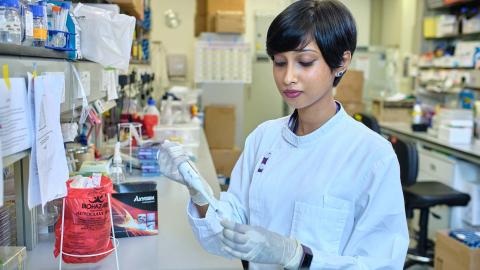Sponsored content: created in partnership with the LKS Faculty of Medicine at the University of Hong Kong
“Doing a PhD is not just about academic knowledge,” says Pavithra Daulagala, who graduated from the LKS Faculty of Medicine at the University of Hong Kong (HKUMed) with a PhD in virology. “During your PhD, you have to fix your weaknesses so you can continue to grow as a person,” says Daulagala, adding that her experience at HKUMed was enriched by support from supervisors and friends.
Daulagala achieved her master’s degree in her home country of Sri Lanka, where she worked as a research assistant in a laboratory established by Malik Peiris, professor and chair of virology at the School of Public Health at HKUMed.
Daulagala was accepted onto PhD programmes in the US and the UK, but one of her supervisors suggested that she contact Peiris in Hong Kong. This was the beginning of her HKUMed journey. “I used to walk into my lab and see his picture every day,” says Daulagala, who adds that she had always admired Peiris’s work but never imagined they would work together.
Daulagala says sending her study proposal to Peiris was one of the best decisions of her career: “I grew as a person and as a researcher over the time of my PhD.” Time management, organisational skills and critical thinking are other important skills she honed. “You work within a team, so you have to learn how to get along with other people,” Daulagala says.
Communicating her work to people outside her field was a transformative skill that Daulagala developed having previously considered herself shy. “I was very fortunate to meet a set of friends from the Faculty of Medicine,” she says. “They are also very passionate people and, during our free time, we would update each other on the progress of our research.”
Seeing her friends organise research seminars and chair events inspired Daulagala to get involved in activities and events. “It gave me the motivation to take part in competitions and organise activities, and gave me more courage to speak up and take up a leadership role,” she says. This new confidence led Daulagala to win first prize at the HKU-Pasteur Three Minute Thesis competition and the best presentation prize at HKUMed’s Research Postgraduate Symposium.
Daulagala stayed at a HKU residential college throughout her studies, where she found a community and opportunities for extra-curricular activities, ranging from salsa classes to overseas trips with friends. “You don’t feel like you’re alone here,” she says.
PhD students at HKUMed are also encouraged to attend international conferences, which helps them form networks and explore potential career paths.
With her PhD complete, Daulagala is deciding whether to continue with academia or move into industry. Her supervisors at HKUMed have been supportive of both options and have shared contacts in various areas for her to explore.
One of the options Daulagala is considering is the new opportunity as part of a collaboration between HKUMed and Hong Kong Science and Technology Park, which will provide her with the experience of working in a start-up environment. “It is headed by our own principal investigator and works on more translational research,” Daulagala says.
Find out more about the LKS Faculty of Medicine at the University of Hong Kong.

Comments